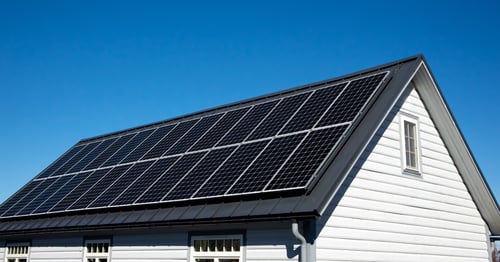Transitioning your home to clean energy used to be just for early adopters, environmental devotees or the DIY curious homeowner. In recent years, the process has become mainstream and far less uncertain - which is good news for homeowners on the journey towards climate stability.
For dollar conscious consumers, the dynamics in the Commonwealth can make the economic story a very powerful motivator for homeowners considering an energy transition. When you take a close look at the numbers, a solectrify decision could be one of the best financial decisions you make this decade.
Why Massachusetts is a great place to solectrify.
When you solectrify, you are doing two things - going solar and electrifying the systems throughout your house. That's it. We've simplified that into a single word- Solectrify - because consumers told us they wanted a simple way to describe the journey of replacing fossil fuels with clean energy.
1. Electricity rates are amongst the highest in the nation.
With electricity rates at $0.26 per kwh and an expectation of continued price increases, the case to generate your own power from your rooftop is even more compelling. Current rooftop solar install costs are comparable to other parts of the country, but the 'cost avoidance' in MA is far greater than communities with lower electricity rates. In fact, a well designed system seeks to generate 100 % offset - meaning your panels produce as much electricity as you consume, and you end up with an average electric bill near zero.
2. Net metering policy is favorable for rooftop solar.
Net metering is a big part of the economic equation for solar -- policy can differ by state and the MA policy is favorable to rooftop solar panel homes.. When you have rooftop solar, you can sell the electricity produced (but not consumed) back to the grid, and in the Commonwealth, you get a credit at the same price you pay. Think about a sunny day when everyone is out of the house- at work or school. You'll likely have excess energy and that energy is 'making money' for you and also helping the electric grid source clean energy. Now, at nighttime, the opposite is likely true - you'll use more than you produce. A well designed rooftop solar array will take all of that into account in sizing your system.
3. Mass Save rebates can offset a large % of total conversion cost
Besides solar, you'll want to change out those fossil fuel systems in your home. To that end, remember that Mass Save programs for heating, cooling, insulation and hot water heater conversion are very attractive compared to other regions of the US. For example, a typical 2,400 sq ft house in the Commonwealth converting from oil heating and central A/C to a heat pump solution would have an average rebate to cost ratio of 38%. That's 38% of your project cost covered by the rebates. Where else can you get a deal like that?. It's a great incentive, and its funded through our utility bills, so why not take advantage of the program while it is available.
4. Attractive financing is available
Mass Save and local banks and credit unions are teamed up to offer zero percent financing for your system conversion projects like heat pump heating, cooling, hot water heating and insulation for qualified homes and homeowners. Some of those same local lenders offer solar loan packages, and also the opportunity to utilize home equity solutions for financing with flexibility. A home equity approach often provides interest rates far lower than basic equipment financing from vendors.
5. You could zero out your total fuel spend.
When you work through the four steps above, you could very well find that monthly savings in fuel cost reduction could be greater than the monthly loan payments you take on to finance the project. Add in the likely increase in home value, and the amortization of your loan, and this could be a big economic win for your household. According to Freddie Mac, homes with better energy efficiency ratings sold for 3% to 5% more compared to lesser-rate homes.
Next Steps
By working with Gridly, we can help you identify energy transition solutions that fit your needs and your budget. Our network of experts can help you determine which options are right for your home. If you’re a Massachusetts-based homeowner, contact us today to learn more about the ways we can help you implement the next steps in your clean energy journey.
